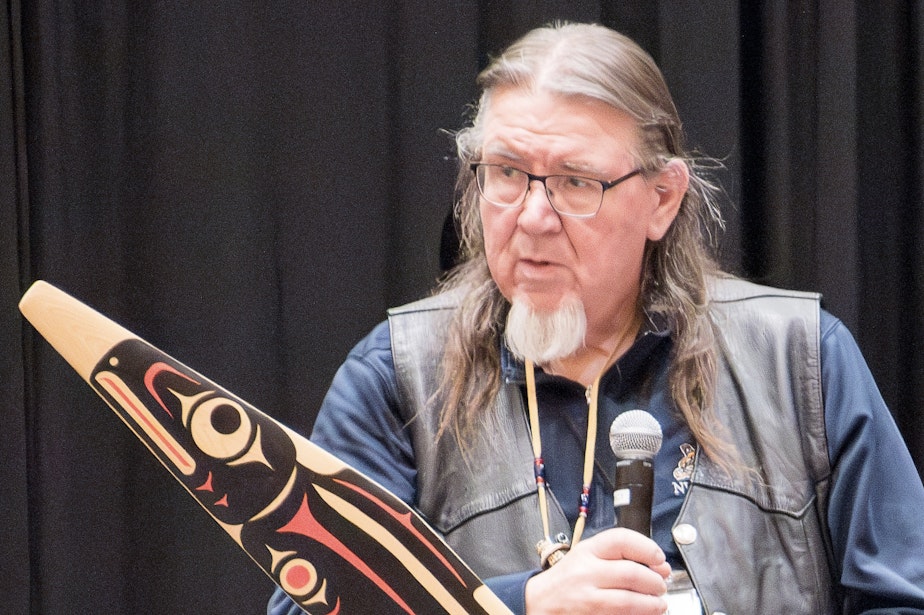Northwest tribes: Treaties mean Trump can’t ax salmon funding
Northwest tribal officials say the Trump administration’s latest budget proposal would violate their treaty rights to catch salmon.
Among other cutbacks, the White House’s proposed 2026 budget for the National Oceanic and Atmospheric Administration (NOAA) would eliminate the Pacific Coast Salmon Recovery Fund, the leading source of money for restoring the Northwest’s struggling salmon runs.
The Trump administration is asking Congress, which controls federal spending, to reduce NOAA’s funding to nearly half of its 2024 levels. While the budget proposal lacks many details, it singles out the $100 million salmon recovery fund and the Office of Oceanic and Atmospheric Research, which had a $638 million budget in 2024, for elimination.
“If the plug is pulled, the tribe will have to do something to protect our treaty rights,” said David Troutt, head of the Nisqually Tribe’s natural resources department. “And if we don't have the ability to do it collaboratively, we'll look to other means, and it may drive us more quickly and more regularly into the courts.”
Federal treaties signed in the 1850s guarantee Northwest tribes the right to fish and hunt in their traditional territories in exchange for giving up most of their land.
“It's in case law. It's in treaties, which are the supreme law of the land, so I don't know what more obligation than that there could be,” Lummi Nation Councilmember Lisa Wilson said.
RELATED: Senior NOAA researchers are being forced out. Is Trump 'killing science'?
“The guarantees were made back in the 1850s to be sure that we will be able to catch salmon forever,” Troutt said. “Well, apparently, forever ends in 2026.”
The relationship between tribes and the federal government could switch from collaborating on watershed restoration to fighting in the courts.
Tribal and state officials say the federal salmon fund is critical to keep the region’s salmon and orcas from going extinct.
“It really anchors salmon recovery across the West Coast,” said Erik Neatherlin, head of the governor's Salmon Recovery Office in Washington state.
West Coast states harbor 28 federally threatened and endangered salmon populations.
“What will suffer are the salmon,” Neatherlin said.
And the people who rely on them.
According to Neatherlin's office, commercial and recreational fishing in West Coast states generates $7 billion in economic activity annually and supports 700,000 jobs.
“Government support of tribal natural resources management is not optional,” Northwest Indian Fisheries Commission Chair Ed Johnstone said in an emailed statement. “The United States has a trust obligation to protect tribal treaty rights to fish, hunt, and gather as we always have.”

Troutt said the Nisqually Tribe has relied on the federal salmon fund to train and employ specialists in restoring habitat and monitoring its results for salmon.
“If this funding goes away, I lose people who are spending their lives working on salmon recovery in the Nisqually, and that kind of investment is simply irreplaceable,” he said.
RELATED: A record-size run of pink salmon may be headed toward Washington state
“We need increased funding for salmon recovery. There’s a lot of work to do,” said Todd Myers with the conservative Washington Policy Center. “We also face a crushing budget debt that will saddle future generations with awful debt, and we have to do something about it.”
“We’re going to have to be less reliant on the federal government and more reliant on ourselves for saving salmon,” Myers said.
A NOAA spokesperson referred inquiries to the White House, which did not respond.
A White House web page announcing the proposed federal budget said it saves taxpayers money by eliminating woke and wasteful spending.
"Just as the Federal Government has intruded on matters best left to American families, it has intruded on matters best left to the levels of government closest to the people, who understand and respect the needs and desires of their communities far better than the Federal Government ever could," Office of Management and Budget director Russell Vought said in his budget cover letter to the U.S. Senate.
Project 2025, the right-wing blueprint for the Trump Administration coauthored by Vought in 2024, calls for NOAA to be broken up.
NOAA’s Office of Oceanic and Atmospheric Research, now slated for elimination, has developed forecasting tools that use sea-surface temperatures and other ocean conditions to predict salmon and other valuable fish populations. Fishery managers use the tool to set catch limits that both support jobs and avoid depleting the resource.
“If we lose that tool, if it becomes weakened because of budget cuts, then we weaken our ability to accurately manage fish, which is not good for the fish and not good for us,” Troutt said.
NOAA also works to protect depleted salmon stocks and other species that are off-limits to harvesting.
Most NOAA Fisheries staff on the West Coast work on conserving endangered species and marine mammals, especially to ensure federal projects do not harm those "protected resources." All that work would be transferred to the U.S. Fish and Wildlife Service, part of the Interior Department, under the Trump proposal.
“Moving the Office of Protected Resources to the Fish and Wildlife Service could potentially put dozens of world-class marine biologists out of a job,” a NOAA employee who requested anonymity to avoid retribution said in a text message. “These are the scientists who have spent their careers protecting species like killer whales. No one else has that expertise, and it would put endangered species at risk.”
RELATED: Scientists say NOAA cuts by Trump undermine improvements in hurricane forecasts
“They are getting more work and having their funding cut at the same time,” another NOAA employee said of the Fish and Wildlife Service. “They already struggle to manage the large array of species they are responsible for now.”
The branch of the Fish and Wildlife Service that manages endangered species would have its budget cut 21% under the Trump proposal.



